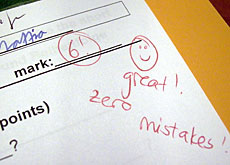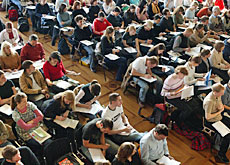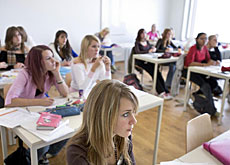Pupils in Geneva have to make the grade

Primary school pupils in Geneva will once again have to face grade-based selection at the end of the academic year after voters backed its reintroduction.
Sunday’s landslide victory – almost 76 per cent of voters supported the initiative – was a major setback for the cantonal government, which has been criticised for its handling of the education system.
The canton’s education ministry, backed by a teaching union, had battled to retain the status quo – the result of wide-ranging education reforms launched in the early 1990s.
Under the old system, same-age pupils moved through the primary school system together whatever their academic level.
Non-selective grading was reintroduced by the education ministry in 2005 to try to head off the vote, but this did not go far enough for critics of the system.
From August next year, third-year pupils – aged eight or nine – will be graded regularly on a scale of one to six. Their average mark will decide whether they progress to the next year or have to redo the third year.
The run-up to the vote was marked by often bitter campaigning. The union representing primary school teachers in Geneva, which sat firmly in the “no” camp, even threatened a campaign of civil disobedience if it didn’t get its way.
“This is not blackmail, but a reality,” warned the union’s president Olivier Baud ahead of the vote.
Defeat
On Monday, having had time to digest defeat, Baud was in a rather less incendiary mood. Asked whether teachers would continue to fight against the introduction of a grading system, he said it was not worth “a war”.
According to Baud, the union is not against the idea of continual assessment but against the idea of selection. He said this would create a two-tier system where only the strongest pupils flourished and the weakest were left behind.
“For us, these grades should not determine whether a pupil progresses or not,” he told swissinfo.
Baud also fears that teachers will in future spend too much time marking pupils’ work instead of teaching them.
“Pupils are there to learn skills and knowledge, and not to have to continually work out where they stand in comparison to others,” he said.
Grading system
André Duval, president of the committee that forced the vote, denied that the campaign was about reintroducing selection. But he added that advancing from one year to the next “should not be automatic”.
He told swissinfo that the initiative was primarily about shifting the emphasis from “education to instruction”, while at the same time giving parents a clearer picture of how their children were faring.
The conference of cantonal education ministers said it could not comment on the Geneva vote, saying the issue of evaluating pupil performance was up to each canton to decide.
But the conference said most of the country’s regional authorities graded children in primary school. According to 2002 figures, only two cantons – Basel City and Appenzell Outer Rhodes – do not do so.
“Almost all cantons start in the third year, some of them even earlier,” said Andreas Messerli of the conference’s information and documentation centre.
swissinfo, Adam Beaumont in Geneva

More
Conference of Cantonal Ministers of Education
Under Switzerland’s federalist system the country’s 26 cantons enjoy a large degree of autonomy in education matters.
But in June this year voters overwhelmingly backed educational reforms aimed at improving coordination among the different school systems and giving the federal authorities a bigger say.
The programme also includes streamlining the total duration of compulsory schooling and the starting age for children, as well as the mutual recognition of diplomas and unified education standards.
Switzerland’s school system has come in for criticism after international studies revealed serious shortcomings in reading among 15-year-olds.

In compliance with the JTI standards
More: SWI swissinfo.ch certified by the Journalism Trust Initiative


You can find an overview of ongoing debates with our journalists here. Please join us!
If you want to start a conversation about a topic raised in this article or want to report factual errors, email us at english@swissinfo.ch.